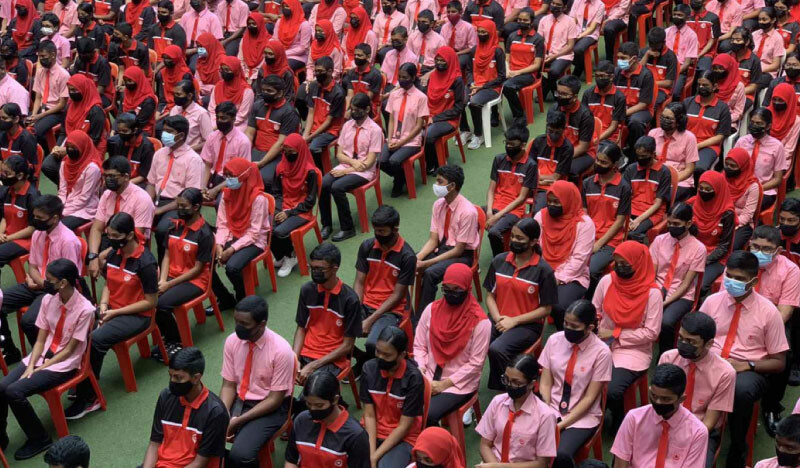Opinion: Students Stuck in Political Crossfire Speak Out

Photo: Raajje.mv
The Maldives’ education sector has seen a whirlwind of changes in the past few years. Students find themselves at the epicenter of a storm, continuing to grapple with increased stress and uncertainty. The recent announcement by the Ministry of Education to prepone exams for seventh, eighth, and ninth graders has sent students into a frenzy. While some disgruntled students have started an online petition, others have taken to social media to air their frustration.
Originally scheduled to be held from April 16 to 27th, the Education Ministry instructed schools to move up second term exams to March 26th, citing a clash with the upcoming parliamentary elections on April 21st. For students, this means a condensed preparation period and added pressure, especially as some of these dates fall during Ramadan.
To shed light on this issue, MV+ conducted interviews with students and educators, taking a look into their experiences and insights.
The Academic Calendar Conundrum
One significant change rocking the boat has been the alterations to the academic calendar. Under the previous administration, the academic year commenced mid-year, a decision purportedly aimed at addressing issues related to the peak tourism season in December. However, the recent shift back to a January start date by the new administration has stirred controversy again.
According to Education Minister Dr. Ismail Shafeeu, 70% of 30,000 individuals surveyed were against the previous change. Defending President Muizzu’s move to revert the academic calendar, Shafeeu emphasised that neither students nor parents were in favor of the altered calendar.
This revelation highlights the disconnect between policy-makers and those directly affected by educational reforms. In the end, it is the schools and students shouldering the burden of these changes. “The term was shortened by about 5 weeks,” reveals a teacher from an international school in Male City. “We had to rush to cover the syllabus. Many changes had to be made.”
With such hectic school schedules, pre-poned exams seem to be a drop in the bucket in comparison. “It’s not much of a difference, honestly,” says the anonymous teacher. “I think the uproar is mostly political.”
The Impact on Students
Amid these political decisions, many students are grappling with the repercussions of what feels like a continuously swinging academic calendar. Suha, a ninth-grade student from Aminiya School, offers a glimpse into the daily struggles of students. “It’s hard. Most kids can’t even eat properly during our 10-minute break,” she laments.
According to Suha, the dwindling break times paired with the burden of juggling multiple subjects has negatively affected students’ academic performance as well. “The top students are doing worse than usual,” she says. “My grades are falling too and it makes me feel really trashy.”
Suha’s account paints a grim picture of the toll sudden changes can have on students’ well-being. Stories related by graduates who spent their school years facing a pandemic serves as a recent example.
Hoodh (not real name), an 2022 graduate of Ahmadiyya School, recounts the chaos wrought by COVID-19. “We lost a big chunk of our 9th year, so we had to play catch-up with the syllabus for a while,” he reveals.
Another graduate, Loona, spent the majority of her 10th grade year struggling to adapt to online classes. “A lot of kids, including myself, had technical difficulties or couldn’t find a quiet place in their home,” she says, adding that classes only continued to get more stressful. “Many students struggled to focus or motivate themselves because it felt like it was happening so fast, (on top of) personal (issues) at home due to COVID.”
Coping Mechanisms and Mental Health Support
Students seeking coping mechanisms for these issues are finding that their support systems fall short of their needs. Suha laments the lack of effective mental health support at her school, despite many of her peers struggling to cope with stress. “We have a school counselor, but no one really goes,” she reveals. “Many kids joke about suicide from exam stress, though sometimes it doesnt feel like a joke”
On the other hand, schools like Ahmadhiya have been known to take proactive steps to address exam stress. Hoodh recalls sessions held with NGOs focusing on exam strategies and stress management techniques. “The teachers became a lot more lenient, letting us have more fun in class,” he adds.
A Call for Change
Facing a chaotic school year, students are calling for change. Suha urges policymakers to consider the long-term consequences of their decisions, emphasising the need for a system that prioritises student well-being above all else. “All this confusion, cramming, and stress is slowly becoming unbearable,” she asserts. “I’m honestly exhausted.”
This sentiment seems to reverberate across the student body, highlighting the pressing need for reforms that prioritize student well-being. Beyond political agendas and administrative decisions lies a young generation yearning for stability, support, and a chance to thrive in a school system that values their holistic well-being above all else.
Children are the future we strive to nurture and protect. We plant trees so our children can sit in the shade. It’s never too late to stop and listen, taking the time to learn and act in the best interests of our students.






